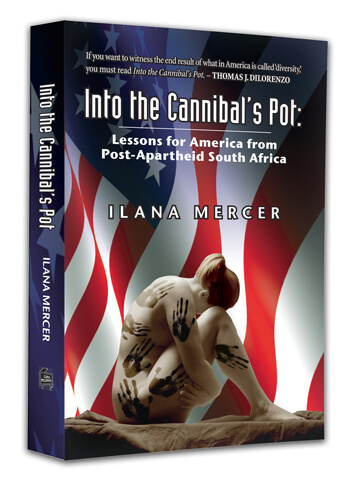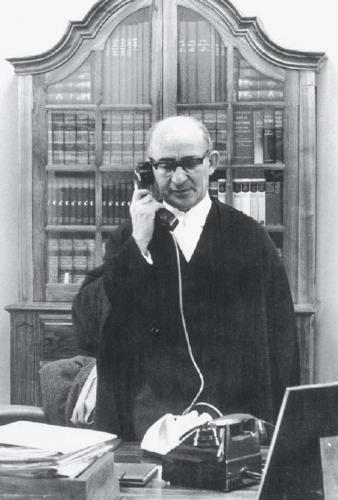“Persecutor” is how my father—once a leading South African anti-Apartheid activist—used to refer to the man who “prosecuted Nelson Mandela for sabotage and conspiracy against the state in 1963 and sent him to jail for life (in the event, he served 27 years).” (The Guardian)
But Percy Yutar was his real name. And “some Jewish leaders hailed him as a ‘credit to the community’ and a symbol of the Jews’ contribution to South Africa.”
“Yutar went on to become attorney general of the Orange Free State and then of the Transvaal. He was elected president of Johannesburg’s largest orthodox synagogue.”
In the opinion of my father (Rabbi Isaacson), recent attempts to portray South Africa’s Jewish community at large as having a record of resistance to Apartheid are pure fiction. My father himself was censured many times by the Board of Deputies and other Jewish leaders—told to quit his anti-establishment activities or risk the loss of the rabbinate. Decamping to Israel, as our family did, was prompted as much by ideals as by the constant threats over the loss of a living.
While the leadership of the then-banned African National Congress was festooned with radical Jews, the truth is that most South African Jews (who have a proud and celebrated history in South Africa,) were not behind this noisy minority. If anything, I suspect them of supporting the Nasionale Party, which governed from 1948 until 1994, by the overwhelming consent of the white minority. Like it or not, white South Africans had a functioning democracy (with popular referenda conducted on most important national questions).
I came from a liberal family. Yet other than my father and my cousin (a Black-Sash activist), I hardly knew a Jew who did not vote National Party (NAT). American paloeconservatives have kibitzed about the South African Jewry’s liberalism. Where from? What do they know? Did they ever survey the community back in those days?
Online sources such as Wikipedia and The Virtual Jewish Library assert the community’s liberal voting patterns. They do not argue it. As far as I can see, they do not provide statistical support for this alleged liberal voting record. I’d like to see some substantiation of these so-called “enlightened” voting patterns.
I am convinced that these depictions are cunning, after the-fact attempts to portray the Jews as more liberal than they in fact were. Yes, Jews have always been socially altruistic, but not to the point of self-immolation. This was a community with vast wealth. Risking the riches they so richly deserved is what Goyim do; Jews not so much. UPDATED II: Risking the future of The Children: that’s not what Jews do. I bet you that, if they preached Progressive Party in public, the same Jews probably voted NAT.
Again, father and cousin aside, I did not know a Jew who did not support the Nasionale Party.
Some members of my family were business tycoons. The same family spawned pig farmers, Jews who lived on the land starting in the early 1900s. (Yeah, funny, I know; they farmed pigs, but didn’t eat ’em.) We’d get together for dinners, during which not even young, outspoken family members (invariably attending medical or law school) ever expressed dismay at the undemocratic nature of South African politics.
I recall vividly when my cousin, a land developer and a pig farmer, decided to emigrate to England after the son of his most loyal farmhand burgled the family homestead and attempted an attack on the family. My cousin was outraged. How could this young black man betray him so? (I could see a few reasons, not least of them the squalor in which farmhands and their families were housed. Free “housing,” yes, but not pretty. I would never have argued this in his company. It was just not done.)
The Jews I knew were what we called verkrampte. (Hard core)
Chris McGreal of The Guardian confirms my suspicions:
“The apartheid regime had a demographic problem and it could not afford the luxury of isolating a section of the white population, even if it was Jewish. Within a few years many South African Jews not only came to feel secure under the new order but comfortable with it. Some found echoes of Israel’s struggle in the revival of Afrikaner nationalism. … The Jew in South Africa sided with the Afrikaners, not so much out of sympathy, but out of fear sided against the blacks. I came to this country in 1946 and all you could hear from Jews was ‘the blacks this and the blacks that.'”
UPDATED I (Jan. 31): THOSE OF YOU who’ve read “Into the Cannibal’s Pot” know that the book speak favorably about the strong Afrikaner-Israel connection, and that the book thinks Percy Yutar did just fine by putting the Marxist Mandela away for his crimes against civilians (for the most).
UPDATE (Feb. 1): Percy Yutar died age 90, in 2002. As this New York Times report tells it,
“According to many South African historians and writers, Mr. Yutar’s vigorous persecution of blacks in the 1960’s was linked to his Jewish background. Glenn Frankel, the author of ‘Rivonia’s Children: Three Families and the Cost of Conscience in White South Africa,’ said that Mr. Yutar saw the trial as a patriotic opportunity, especially because some of Mr. Mandela’s co-defendants were Jews. … ‘Who better to prosecute Jewish traitors than a loyal Jew?’ Mr. Frankel wrote, describing Mr. Yutar’s thinking. ‘Who better than he to put things right and prove that not all Jews were radicals hell-bent upon overthrowing the government?'”
Mr. Yutar, one of eight children in a family of Lithuanian immigrants, was born in Cape Town on July 29, 1911. As a young man, his left hand was caught in an electric mincing machine when he was working in his father’s butcher shop, leaving his hand badly mangled.
He attended the University of Cape Town on a scholarship and was awarded a doctorate in law. Jews, however, were not welcome in the higher echelons of South Africa’s civil service, and Mr. Yutar settled for a job tracing defaulting telephone subscribers for the postal service. Still he persisted in his legal career and slowly moved up the ladder to junior law clerk and junior prosecutor. Eventually, he became deputy attorney general for the Transvaal Province and gained a reputation as an especially ambitious and energetic prosecutor.


